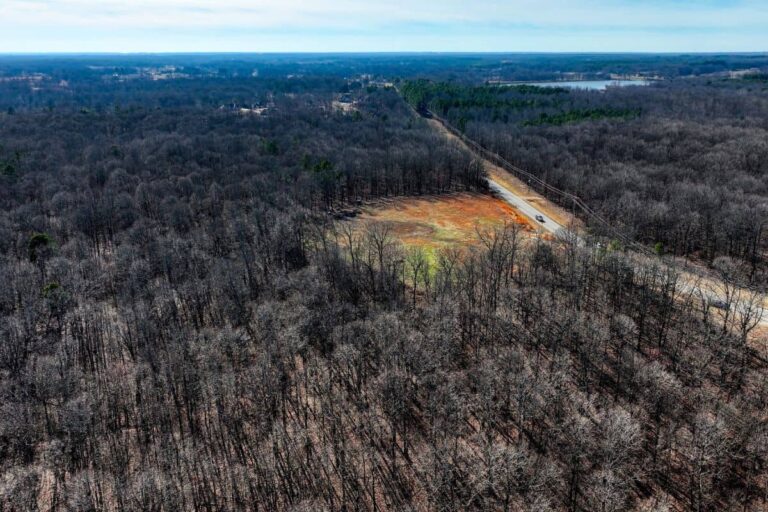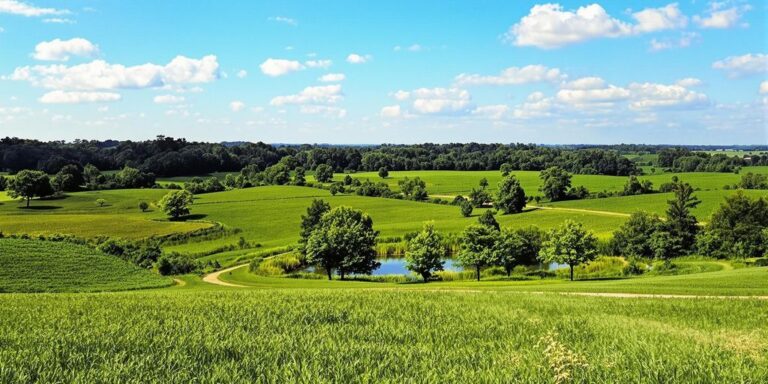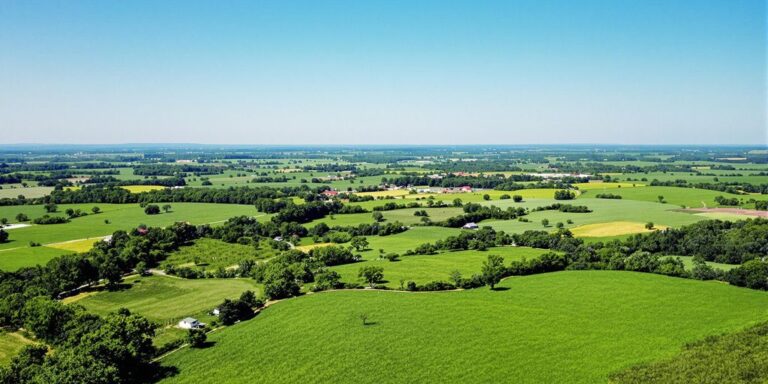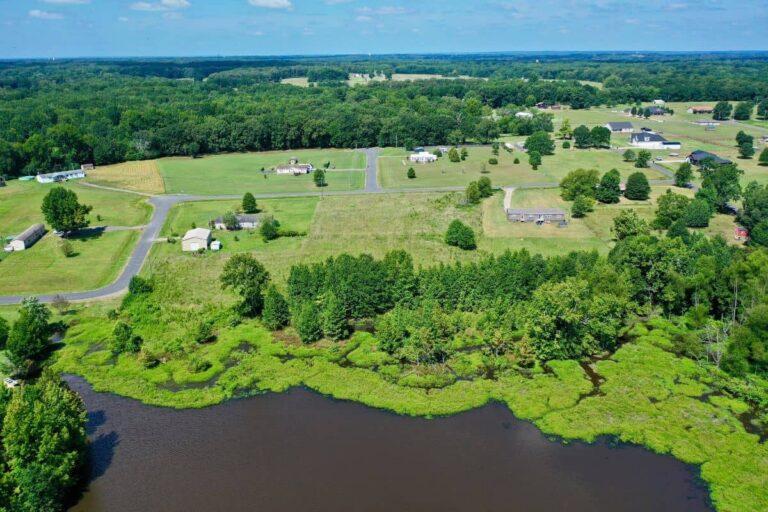Figuring out the best time to Sell Land in Arkansas can feel a bit like trying to predict the weather – sometimes it’s clear, other times, not so much. There are a bunch of things that can make a difference, like the time of year, what’s going on with the economy, and even how many people are looking to buy. This article will walk you through some common ideas about when to put your land on the market, helping you get a good sense of what might work for you.
Key Takeaways
- Spring generally sees more buyers, but competition can be high.
- Summer offers good visibility, especially for recreational land.
- Fall can attract serious buyers looking to close before winter.
- Winter has fewer buyers, but those looking are often highly motivated.
- Economic conditions and interest rates play a big part in buyer activity.
1. Spring
Spring can be a great time to put your land on the market in Arkansas. As the weather warms up, more people are out and about, and that includes potential buyers. The real estate market often sees a surge in activity during these months.
Here’s why spring might be your season:
- More daylight hours mean more time for showings.
- Landscaping and natural greenery are at their peak, boosting curb appeal.
- Families often look to move during the summer break, so they start their search in the spring.
Selling in the spring can mean facing more competition. It’s important to make sure your land stands out. Consider sprucing things up and highlighting the best features to attract buyers.
However, keep in mind that the Northwest Arkansas land values can fluctuate, so it’s always a good idea to stay informed about the current market trends. You might even see sales increase as much as 34% between February and March, so timing can be everything.
2. Summer
Summer is often considered the peak season for real estate, and for good reason. The increase in buyers that starts in spring really takes off when summer arrives. Traditionally, June, July, and August see the most activity, accounting for a large percentage of annual real estate sales. Buyer enthusiasm usually peaks in June.
With interest rates and many potential buyers weighing their needs against inflation, the summer housing market can be hard to predict. But even if the overall sales volume is lower, buyer and seller activity should still increase during the summer months.
Selling in the summer has its perks. Families often want to move before school starts, creating a deadline for buyers. Plus, you’re less likely to deal with rain while moving.
Here are some things to keep in mind:
- Buyer demand is at its highest in the summer.
- Homes tend to sell for more money during these months.
- Homes also tend to sell faster.
However, there are also some drawbacks. Competition increases as more homeowners list their homes to take advantage of the high buyer traffic. Sellers in hot climates might need to plan around the heat, which could deter some buyers from touring homes. It’s important to consider the competition when pricing your land.
3. Fall
Fall in Arkansas can be a pretty good time to think about selling your land. The intense heat of summer has passed, and the holiday rush hasn’t quite started yet. It’s like a sweet spot for potential buyers who are serious but don’t want to deal with the summer crowds or winter craziness.
The fall season provides softer lighting, mild temperatures, and pretty weather foliage as a backdrop to your home.
Here’s a quick look at some pros of selling in the fall:
- Less competition: The market isn’t as flooded as it is in the summer.
- Serious buyers: People looking in the fall are often ready to make a move.
- Good prices: You can still get decent prices, sometimes even better than average.
One thing to keep in mind is that buyer traffic does tend to slow down a bit compared to spring and summer. You’ll also need to stay on top of yard maintenance, like raking leaves, to keep your property looking its best. But overall, fall can be a solid choice for selling, especially if you’re aiming for a quicker sale than you might get in the winter.
While summer might bring in the highest offers, closing a deal in October or November can still get you a good price. Plus, homes tend to sell relatively fast during this time. Just remember that Arkansas’s land market can be unpredictable, so it’s always a good idea to stay informed.
4. Winter
Winter in Arkansas presents a unique set of circumstances for selling land. It’s not always the first season that comes to mind for real estate transactions, but it can have some advantages if you play your cards right. Let’s break down what to expect.
Buyer activity tends to slow down during the winter months, especially around the holidays. People are often preoccupied with family, travel, and end-of-year commitments. This can translate to fewer potential buyers actively searching for land.
However, those who are looking during the winter are often highly motivated. They might have specific needs or timelines that require them to purchase regardless of the season. This can lead to more serious offers and potentially quicker sales.
Winter can be a good time to stand out from the crowd. With fewer listings on the market, your property might get more attention from the buyers who are actively searching. Just be prepared to deal with weather-related challenges and potentially longer closing times.
Here’s a quick look at some pros and cons:
- Pros: Less competition, serious buyers, potential for quicker sales with motivated individuals.
- Cons: Slower overall market, weather-related challenges, potentially lower prices due to decreased demand.
- Consider the auction farmland option to sell your land in the winter.
Ultimately, the decision to sell in winter depends on your specific circumstances and goals. If you’re not in a rush and are willing to wait for the right offer, it could be a viable option. Just be sure to weigh the pros and cons carefully and prepare your property accordingly.
5. Economic Considerations

Selling land isn’t just about the season; it’s also about the money, honey! The overall economic climate plays a huge role in whether or not people are buying, and how much they’re willing to spend. Let’s break down some key factors.
It’s important to remember that economic conditions can change rapidly. Staying informed and adapting your strategy is key to a successful sale.
- Inflation: When prices are rising, buyers might be more hesitant to make big purchases. Keep an eye on inflation rates and how they might affect buyer behavior.
- Unemployment: A strong job market usually means more people are confident and willing to invest in land. High unemployment can have the opposite effect.
- GDP Growth: A growing economy generally leads to more investment opportunities, including land purchases. Stagnant or declining GDP can signal a slowdown in the real estate market.
Understanding these dynamics helps you position your property to attract the right buyers at the right time. For example, springtime or summer might offer freshly planted crops or lush, green fields, making the land more visually appealing in marketing and showings. Economic factors like rural land interest rates and government policies also play a crucial role. Selling when rates are low might attract more buyers, while supportive agricultural policies can boost land values. Careful analysis of these factors will help you determine the optimum time to list your farm land, ensuring you reach potential buyers ready to make a purchase.
6. Preparing Your Land for Sale
Okay, so you’re thinking about selling your land. Awesome! But before you just slap a “For Sale” sign out there, there’s some stuff you should probably do to make it more appealing and, honestly, get a better price. Think of it like getting your house ready to sell – same idea, just on a bigger scale.
First impressions matter, so make sure your land looks its best.
- Clean Up: Seriously, get rid of any junk. Old tires, broken equipment, random piles of stuff – gone. A clean property looks cared for. This is a great time to get your land ready.
- Clear Boundaries: Make sure your property lines are clearly marked. Fences in good repair are a plus. Nobody wants to buy something if they aren’t sure where it starts and ends.
- Fix What’s Broken: Got a dilapidated barn? A broken-down fence? If it’s not too expensive to fix, do it. It shows you’ve taken care of the place.
Think of it this way: you’re selling potential. You want buyers to see the possibilities, not the problems. A little effort now can pay off big time later.
7. Local Housing Market

Understanding the local housing market is super important when you’re thinking about selling land. It’s not just about national trends; what’s happening right in your area of Arkansas matters most. Things like job growth, new businesses moving in, and even local events can all affect how quickly land sells and for how much.
Keeping an eye on these local factors can really help you time your sale for the best possible outcome.
- Check local real estate websites and news sources regularly.
- Attend local community meetings to hear about upcoming developments.
- Talk to neighbors and other landowners about their experiences.
It’s easy to get caught up in national news, but remember that real estate is local. What’s happening in Little Rock might be totally different from what’s happening in Fayetteville. Pay attention to the specific trends in your area to make informed decisions.
To get a better grasp, consider these points:
- Inventory Levels: Are there a lot of properties for sale, or is inventory low? Low inventory usually means higher prices.
- Days on Market: How long are properties staying on the market? A shorter time frame indicates a hot market.
- Sale-to-List Price Ratio: Are properties selling for above, below, or at their listing price? This shows how competitive the market is.
For example, here’s a hypothetical look at different regions in Arkansas:
| Region | Inventory | Days on Market | Sale-to-List Price Ratio |
|---|---|---|---|
| Northwest | Low | 30 | 102% |
| Central | Moderate | 45 | 98% |
| Southern | High | 60 | 95% |
This table shows that Northwest Arkansas might be a better place to sell right now compared to Southern Arkansas, based on these metrics. Remember that mortgage rates can also influence buyer behavior. In April, Arkansas home prices increased, but home sales decreased, while the inventory of homes for sale rose.
8. Real Estate Agent
Selling land can be tricky, and that’s where a good real estate agent comes in. They’re not just there to put a sign in the ground; they can be a huge help in getting the best price for your property. A skilled agent understands the local market, knows how to market your land effectively, and can negotiate on your behalf.
Think of it this way: you could try to sell the land yourself, but you might end up leaving money on the table or dealing with a lot of headaches. A good agent is worth their weight in gold, especially if you’re not familiar with the ins and outs of real estate transactions.
Here’s why using a real estate agent is often a smart move:
- They have access to a wide network of potential buyers.
- They know how to price your land competitively.
- They handle all the paperwork and legal stuff, which can be a real pain.
- They can negotiate offers to get you the best possible deal.
- They can help you navigate any potential issues that come up during the sale.
Finding the right agent is key. Look for someone with experience selling land in Arkansas, a solid track record, and good communication skills. Don’t be afraid to interview a few different agents before making a decision.
It’s also important to understand how real estate commission works. It’s usually a percentage of the sale price, and it covers the agent’s fees for marketing, negotiating, and closing the deal. While it might seem like a lot, remember that a good agent can often get you a higher sale price, which can more than offset the commission. Plus, they handle all the work, so you don’t have to.
9. Interest Rates
Interest rates play a big role in the land market. It’s pretty simple: when rates are low, more people can afford to borrow money, which means more folks are out there looking to buy land. When rates go up, things tend to cool off. It’s all about affordability.
Keeping an eye on interest rates is key to timing your land sale.
Think of it like this: if rates are low, you might attract more buyers, potentially leading to a quicker sale and maybe even a higher price. But if rates are high, you might need to adjust your expectations.
- Lower rates often mean more buyers.
- Higher rates can reduce buyer demand.
- Staying informed helps you make smart decisions.
It’s a good idea to chat with a financial advisor or real estate pro to get a handle on how interest rates might affect your specific situation. They can offer insights tailored to the Arkansas land market.
It’s not just about the overall rate, either. Different types of loans can have different rates, and that can impact who’s able to buy. For example, someone looking at rural land in Northwest Arkansas might be considering a specific type of loan with its own rate structure. So, understanding the nuances can really help you target the right buyers.
Here’s a quick look at how interest rates can affect things:
| Interest Rate | Buyer Activity | Sale Price |
|---|---|---|
| Low | High | Potentially Higher |
| High | Lower | May Stabilize or Decrease |
10. Government Policies
Government policies can really shake things up when you’re trying to sell land. It’s not always straightforward, but understanding the basics can save you a lot of headaches. These policies can affect everything from land values to who’s even able to buy your property. Let’s break it down.
Impact of Agricultural Subsidies
Agricultural subsidies can play a big role in land values. If the government is offering financial support for certain crops, that can make land suitable for those crops more attractive to buyers. It’s all about the potential income a buyer can generate from the land. Keep an eye on what crops are getting the most support, as that can shift demand.
Environmental Regulations
Environmental regulations are another biggie. These rules can limit what a buyer can do with the land, which can affect its value. For example, if there are restrictions on building near wetlands or protected areas, that’s going to narrow down the pool of potential buyers. Make sure you’re up-to-date on all the local and state environmental rules.
Zoning Laws and Land Use
Zoning laws dictate what the land can be used for. Is it zoned for agriculture, residential, or commercial use? This is a huge factor for buyers. A piece of land zoned for residential development is going to be worth a lot more than one zoned for agriculture. Check with your local government to see if there are any planned changes to zoning laws, as that could impact your sale.
Staying informed about government policies is key. Changes in these policies can create opportunities or challenges for sellers. It’s worth consulting with a real estate professional who understands the local landscape and can help you navigate these complexities.
Tax Incentives
Tax incentives can also sweeten the deal for buyers. For example, if there are tax breaks for preserving farmland or for implementing certain conservation practices, that can make your land more appealing. Be sure to highlight any tax benefits in your marketing materials. Here’s a quick list of things to consider:
- Check for federal and state tax incentives.
- Understand how these incentives affect buyer interest.
- Promote these benefits in your listing.
Wrapping Things Up
So, when it comes to selling land in Arkansas, there’s no single “perfect” time that works for everyone. It really depends on what kind of land you have and what’s going on in the market. Things like the time of year, what the economy is doing, and even what’s happening locally can all play a part. The best move you can make is to team up with a good real estate agent who knows the Arkansas market inside and out. They can help you figure out the best time to put your land up for sale, making sure you get the most out of it. It’s all about making smart choices based on good information.
Frequently Asked Questions
When is the best time to sell land in Arkansas?
Spring is often the best time to sell land in Arkansas. The weather is good, and the land looks its best with new growth. More buyers are also looking to purchase property during this season.
Does the local market affect land sales?
Yes, the local market matters a lot. What’s happening in your specific area of Arkansas, like new jobs or building projects, can really change how fast your land sells and for how much.
What does ‘preparing your land for sale’ mean?
Preparing your land means cleaning it up, fixing anything broken, and making it look nice. This helps attract more buyers and can lead to a better selling price.
Why should I use a real estate agent?
A good real estate agent knows the local market well and can help you set the right price, market your land effectively, and handle all the paperwork. This makes selling much easier and often more profitable.
How do interest rates impact land sales?
When interest rates are low, it’s cheaper for buyers to borrow money. This means more people can afford to buy land, which can help your property sell faster and for a better price.
Can government policies affect land value?
Government policies, like those about farming or land use, can change the value of land. For example, policies that support agriculture might make farmland more valuable.






